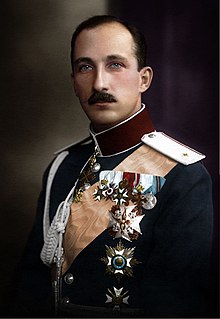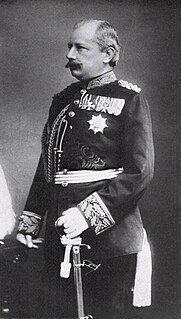 W
WAlbert was the King of Saxony and a member of the House of Wettin.
 W
WGebhard Leberecht von Blücher, Fürst von Wahlstatt, Graf (count), later elevated to Fürst von Wahlstatt, was a Prussian Generalfeldmarschall. He earned his greatest recognition after leading his army against Napoleon I at the Battle of the Nations at Leipzig in 1813 and the Battle of Waterloo in 1815.
 W
WBoris III, originally Boris Klemens Robert Maria Pius Ludwig Stanislaus Xaver, was the Tsar of the Kingdom of Bulgaria from 1918 until his death.
 W
WFriedrich Wilhelm Freiherr von Bülow, Graf von Dennewitz was a Prussian general of the Napoleonic Wars.
 W
WCharles XIV John was King of Sweden and Norway from 1818 until his death. In modern Norwegian lists of kings he is called Charles III John. He was the first monarch of the Bernadotte dynasty.
 W
WKarl August, Hereditary Grand Duke of Saxe-Weimar-Eisenach was a German prince and Hereditary Grand Duke (Erbgroßherzog) of Saxe-Weimar-Eisenach.
 W
WCharles Edward, Duke of Saxe-Coburg and Gotha was the last reigning duke of Saxe-Coburg and Gotha from 30 July 1900 until 1918. A male-line grandson of Queen Victoria and Prince Albert, he was also until 1919 a Prince of the United Kingdom and from birth held the British titles of Duke of Albany, Earl of Clarence and Baron Arklow.
 W
WFrederick Francis II was a Prussian officer and Grand Duke of Mecklenburg-Schwerin from 7 March 1842 until 15 April 1883.
 W
WFrederick III was German Emperor and King of Prussia between March and June 1888, during the Year of the Three Emperors. Known informally as "Fritz", he was the only son of Emperor Wilhelm I and was raised in his family's tradition of military service. Although celebrated as a young man for his leadership and successes during the Second Schleswig, Austro-Prussian and Franco-Prussian wars, he nevertheless professed a hatred of warfare and was praised by friends and enemies alike for his humane conduct. Following the unification of Germany in 1871 his father, then King of Prussia, became the German Emperor. Upon Wilhelm's death at the age of ninety on 9 March 1888, the thrones passed to Frederick, who had by then been German Crown Prince for seventeen years and Crown Prince of Prussia for twenty-seven years. Frederick was suffering from cancer of the larynx when he died, aged fifty-six, following unsuccessful medical treatments for his condition.
 W
WPrince Friedrich Karl Nikolaus of Prussia was the son of Prince Charles of Prussia (1801–1883) and his wife, Princess Marie of Saxe-Weimar-Eisenach (1808–1877). Prince Friedrich Karl was a grandson of King Frederick William III of Prussia and a nephew of Frederick William IV and William I. He was born in Berlin at the Royal Palace.
 W
WAugust Karl Friedrich Christian von Goeben, was a Prussian infantry general, who won the Iron Cross for his service in the Franco-Prussian War of 1870–71.
 W
WHermann Wilhelm Göring was a German politician, military leader and convicted war criminal. He was one of the most powerful figures in the Nazi Party, which ruled Germany from 1933 to 1945.
 W
WPaul Ludwig Hans Anton von Beneckendorff und von Hindenburg, was a German general and statesman who led the Imperial German Army during World War I and later became President of Germany from 1925 until his death in 1934. During his presidency, he played a key role in the Nazi seizure of power in January 1933 when, under pressure from advisers, he appointed Adolf Hitler as Chancellor of Germany.
 W
WLeopold Maximilian Joseph Maria Arnulf, Prinz von Bayern was born in Munich, the son of Prince Regent Luitpold of Bavaria (1821–1912) and his wife Archduchess Augusta of Austria (1825–1864). He was a Field Marshal (Generalfeldmarschall) who commanded German and Austro-Hungarian forces on the Eastern Front in World War I.
 W
WErich Friedrich Wilhelm Ludendorff was a German general, politician and military theorist. He achieved fame during World War I for his central role in the German victories at Liège and Tannenberg in 1914. Following his appointment as First Quartermaster-general of the Imperial Army's Great General Staff in 1916, he became the chief policymaker in a de facto military dictatorship that dominated Germany for the rest of the war. After Germany's defeat, he contributed significantly to the Nazis' rise to power.
 W
WAnton Ludwig Friedrich August Mackensen was a German field marshal. He commanded successfully during the First World War of 1914–1918 and became one of the German Empire's most prominent and competent military leaders. After the armistice of November 1918 the victorious Allies interned Mackensen in Serbia for a year. He retired from the army in 1920; in 1933 Hermann Göring made him a Prussian state councillor. During the Nazi era (1933–1945), Mackensen remained a committed monarchist and sometimes appeared at official functions in his First World War uniform. Senior NSDAP members suspected him of disloyalty to the Third Reich, but nothing was proven against him.
 W
WEdwin Karl Rochus Freiherr von Manteuffel was a Prussian Generalfeldmarschall noted for his victories in the Franco-Prussian War.
 W
WHelmuth Karl Bernhard Graf von Moltke was a Prussian field marshal. The chief of staff of the Prussian Army for thirty years, he is regarded as the creator of a new, more modern method of directing armies in the field. He commanded troops in Europe and the Middle East, commanding during the Second Schleswig War, Austro-Prussian War and the Franco-Prussian War. He is described as embodying "Prussian military organization and tactical genius." He was fascinated with railways and pioneered their military usage. He is often referred to as Moltke the Elder to distinguish him from his nephew Helmuth Johann Ludwig von Moltke, who commanded the German Army at the outbreak of World War I.
 W
WBogislav Friedrich Emanuel Graf Tauentzien von Wittenberg was a Prussian general of the Napoleonic Wars.
 W
WKarl Wilhelm Friedrich August Leopold Graf von Werder was a Prussian general.
 W
WWilhelm II, anglicised as William II, was the last German Emperor (Kaiser) and King of Prussia, reigning from 15 June 1888 until his abdication on 9 November 1918. Despite strengthening the German Empire's position as a great power by building a blue-water navy and promoting scientific innovation, his tactless public statements and erratic foreign policy greatly antagonized the international community and are considered by many to be one of the underlying causes for World War I. When the German war effort collapsed after a series of crushing defeats on the Western Front in 1918, he was forced to abdicate, thereby bringing an end to the House of Hohenzollern's three-hundred-year reign.
 W
WWilliam I or Wilhelm I was King of Prussia from 2 January 1861 and German Emperor from 18 January 1871 until his death in 1888. A member of the House of Hohenzollern, he was the first head of state of a united Germany. He was de facto head of state of Prussia from 1858, when he became regent for his brother Frederick William IV, and he became king when his brother died three years later.
 W
WJohann David Ludwig Graf Yorck von Wartenburg was a Prussian Generalfeldmarschall instrumental in the switching of the Kingdom of Prussia from a French alliance to a Russian alliance during the War of the Sixth Coalition. Ludwig van Beethoven's "Yorckscher Marsch" is named in his honor.